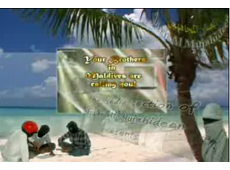A team of experts from the Israeli Foreign Ministry are training 35 Maldivian officials in emergency preparedness, with a focus on the management of mass casualties.
The experts from the ministry’s Agency for International Development Cooperation arrived on 27 January to run a two week course drawing on Israel’s experience with emergency response.
“Israel is one of the best in the field when it comes to emergency response,” said Abdulla Shahid, chief coordinator of the Maldives’ National Disaster Management Centre.
Many aid agencies had conducted disaster-response training in the Maldives after the “wake up” call of the 2004 tsunami, Shahid said, “but much of it was ad hoc and it wasn’t run under a proper department until this government came into power.”
He acknowledged while that there was little the Maldives could do to prevent a tsunami, it was possible to prepare for them; “things such as monitoring how you alter the environment and construct buildings. Artificial – reclaimed – islands were the worst hit and suffered the most number of casualties. Male’ is more than half artificial,” he noted.
Earthquakes were also a concern, especially because of the country’s “very poor building and construction standards – God forbid if anything happened.”
“On 15 July 2003 there was an earthquake 270 miles southwest of Addu measuring 7.6 on the Richter scale, which shook the whole of the southern Maldives. So we cannot say we are not an earthquake-prone country,” Shahid said.
“Since the earthquake in Haiti we’ve had to rethink [our approach]. A lot of warning was given by Haiti’s neighbours, particularly by the US Geological Survey. But they were not taken very seriously.”
Shahid also observed that “a quarter of the world’s crude oil travels within 20 miles of the north of the Maldives.”
Terrorist incidents, “especially given the state of the world at the moment”, were not being discounted either, Shahid said.
“In fact, mass casualty scenarios were the main focus of the Israeli training,” he said.
Politics
Working with Israel on aid projects was not politically difficult, Shahid said, despite parliament’s no-confidence motion against Foreign Minister Ahmed Shaheed after he said at a press conference on 15 September 2009 that the the government was in the process of establishing ties with Israel, and he did not see any reason not to pursue it.
Shaheed narrowly survived the no-confidence voting with 37 MPs voting in favour, two short of the majority needed to remove the foreign minister.
Vice president of the Adaalath party Asim Mohamed said the Maldives “should collaborate with anyone willing to help us in our development.”
Shahid meanwhile noted that “we were working with Israel throughout the no-confidence motion.” The issue, he said, “had nothing to do with Israel and 100 per cent with local politics.”
The Israeli trainers had travelled to 18 islands across the country without incident, he explained, “and received warm welcomes and typical island hospitality.”
The government was exploring further training projects with Israel around developing paramedics and agriculture, “two areas in which Israel is state of the art.”
